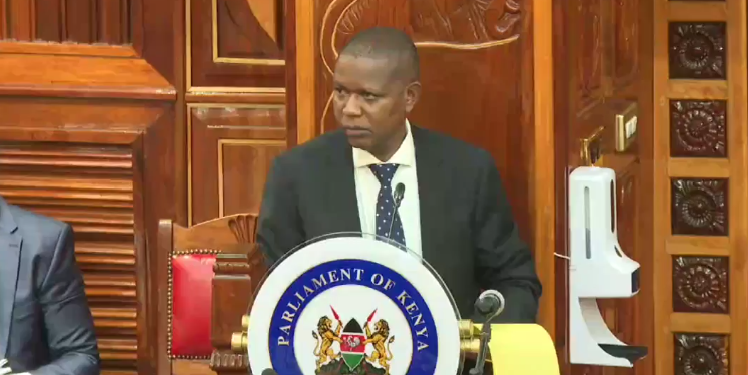Kibwezi MP Mwengi Mutuse, the mover behind Deputy President Rigathi Gachagua’s impeachment motion, on Thursday, defended his case before senators, clarifying that his goal is to establish political responsibility, not criminal liability, as pressure mounts on him to substantiate his claims.
Mutuse, responding to a series of pointed questions from senators, said that his role under Kenyan law is not to investigate or prove guilt beyond a reasonable doubt. Instead, he sought to present circumstantial evidence that he claimed connects Gachagua to money laundering, corruption, and misuse of office, accusing him of amassing unexplained wealth during his tenure.
“My work here is not to prove criminal liability. It is not to prove beyond reasonable doubt. My work is not to prove civil liability but to show political responsibility, and I have been able to do that,” Mutuse told the Senate. He added that Kenyan law requires public officials to account for their wealth if their income does not support their acquisitions.
Mutuse’s appearance comes after a heated session on Wednesday, where he was grilled by senators and struggled to substantiate several claims in the impeachment motion. The MP had been unable to explain the involvement of some companies listed in the motion and faced accusations of presenting weak evidence. Thursday’s session gave him an opportunity to clarify his position, and he used it to underline the circumstantial evidence he believes builds a strong case against the deputy president.
The impeachment motion against Gachagua lists 22 companies allegedly linked to suspicious dealings. Mutuse explained to the Senate that several of these companies had been implicated in past cases of money laundering and corruption, including some linked to Nyeri County. He argued that the DP’s ties to these companies, which were reportedly involved in county business and flagged in a past impeachment of a Nyeri governor, raised questions about his involvement in corrupt activities.
“Many of the companies listed were complained about by the county assembly of Nyeri during the impeachment of Governor Nderitu Gachagua. It was alleged that a brother to the late governor, Rigathi Gachagua, was behind these businesses,” Mutuse stated, referencing the deputy president’s business ties. He insisted that the companies were part of a broader “web of secrecy” aimed at shielding Gachagua’s interests from scrutiny.
Mutuse further claimed that those involved in the companies were proxies for the deputy president and that their operations pointed to potential money laundering and abuse of office. He accused Gachagua of using his political power to influence business deals that resulted in significant wealth accumulation for himself and his close associates.
One of the central points in Mutuse’s argument was the unexplained rise in Gachagua’s wealth. The MP presented evidence showing that Gachagua’s fortune had grown from KES 800 million to KES 5.2 billion, which he alleged was far beyond what his known income streams could support. He called on the DP to explain the sources of his wealth.
“The law on unexplained assets is such that you are asked, ‘You own this, please tell us how you acquired it,’ because as far as we know, your legitimate income cannot support this,” Mutuse told the Senate. He argued that the DP’s wealth accumulation pointed to corruption, adding that Gachagua had failed to produce credible explanations for the vast amounts of money tied to his name.
Mutuse further questioned the involvement of Gachagua’s relatives in his businesses, particularly his brother’s children, who allegedly held directorships in key companies linked to the DP. “Why would my brother’s children own my estate and not my children? Don’t you see this is suspicious? It is obviously suspicious,” he said, suggesting that the move was part of a scheme to obscure the true ownership of assets.
Mutuse also cast doubt on Gachagua’s claims that several properties linked to him had been acquired through loans. He pointed to the Abas Safari Lodges as an example, arguing that no evidence had been presented to prove that the deputy president had taken a legitimate loan to purchase the property.
“They said they obtained a loan of KES 600 million, but the only document produced was an offer letter for the loan. There is no evidence to show that the loan was granted, nor is there any charge on that loan,” Mutuse said. He urged the Senate to scrutinize the DP’s financial dealings, which he said raised serious questions about transparency and accountability.
One of the most contentious properties in the motion was the Olive Gardens hotel, which Mutuse claimed was managed by a close associate of Gachagua. According to the MP, a senior staffer in the DP’s office was also managing the hotel, further cementing the alleged link between the property and the deputy president.
“It is not just about direct evidence. It is also about the circumstantial evidence and the circumstances that led us to where we are,” Mutuse argued, adding that the Senate had a responsibility to consider the broader context of the allegations.


















